 "Slant6" (slant-6)
"Slant6" (slant-6)
01/11/2015 at 11:27 • Filed to: NASCAR, Stock Cars, The Future, Racing
 60
60
 100
100
 "Slant6" (slant-6)
"Slant6" (slant-6)
01/11/2015 at 11:27 • Filed to: NASCAR, Stock Cars, The Future, Racing |  60 60
|  100 100 |
The National Association for Stock Car Auto Racing, (NASCAR) is one of the best known stock car racing franchises in the world, but is it really "stock" car racing? Not a single Sprint Cup race car (with the exception of the pace car) is an actual production vehicle. Sure, Toyota might say their current stock car is a Camry, but Toyota has never made a rear-wheel-drive V8 solid axle Camry with a tube frame. Which brings up the question: how is this a stock car?
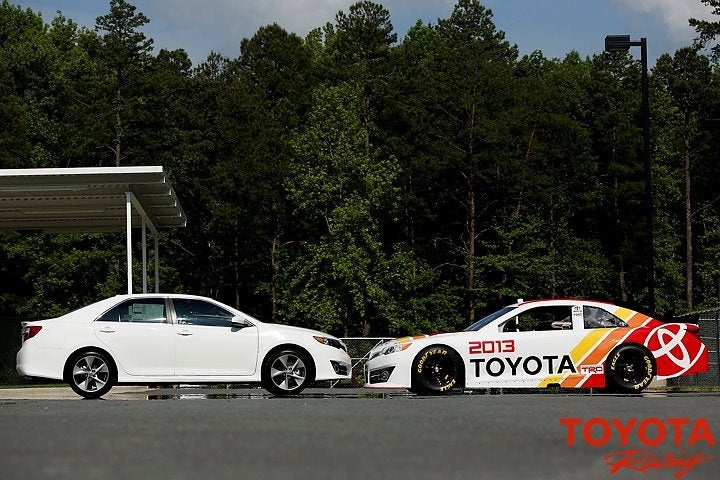
By definition a stock car is a standard model of automobile changed in various ways for racing purposes. These purpose-built racers we see in NASCAR are not in fact stock cars, they're race cars. But why are they called stock cars? Early auto racing used open wheeled race cars, built from the ground up specifically for racing circuits. These vehicles were complex and expensive to build. As popularity grew more people wanted to enter races but couldn't due to the high cost of building a car. Open wheeled racing was seen as an aristocratic sport, one that the average man couldn't compete in. This didn't stop the people from racing though. By the 1920s dirt tracks across the South East began hosting stock car racing events, often between Moonshiners who would race their souped up get away cars. Although modified, their cars were still based on production vehicles.
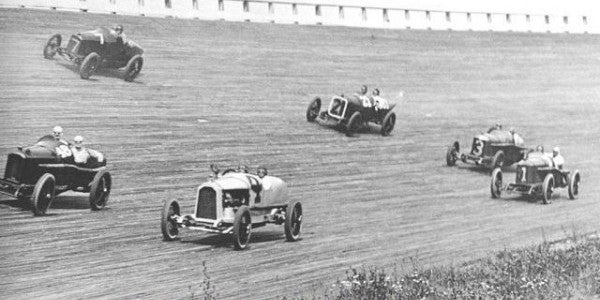
In 1948 NASCAR was founded as a sanctioning body for stock car races. One of the first NASCAR series was the Strictly Stock series, which was a race exclusively for late model cars, unmodified (not to say that all teams followed this rule) with the exception of crude safety equipment. This requirement to remain unmodified drove manufactures to produce faster cars. Similar to the development of technology induced by NASA in landing on the moon, NASCAR stimulated technological growth within the automobile industry. Manufacturer's benefited from their participation not only by having a more refined product but by the marketing strength that came with winning races. Bob Tasca, a Rhode Island Ford dealer and racing team owner coined the phrase "Race on Sunday, sell on Monday".
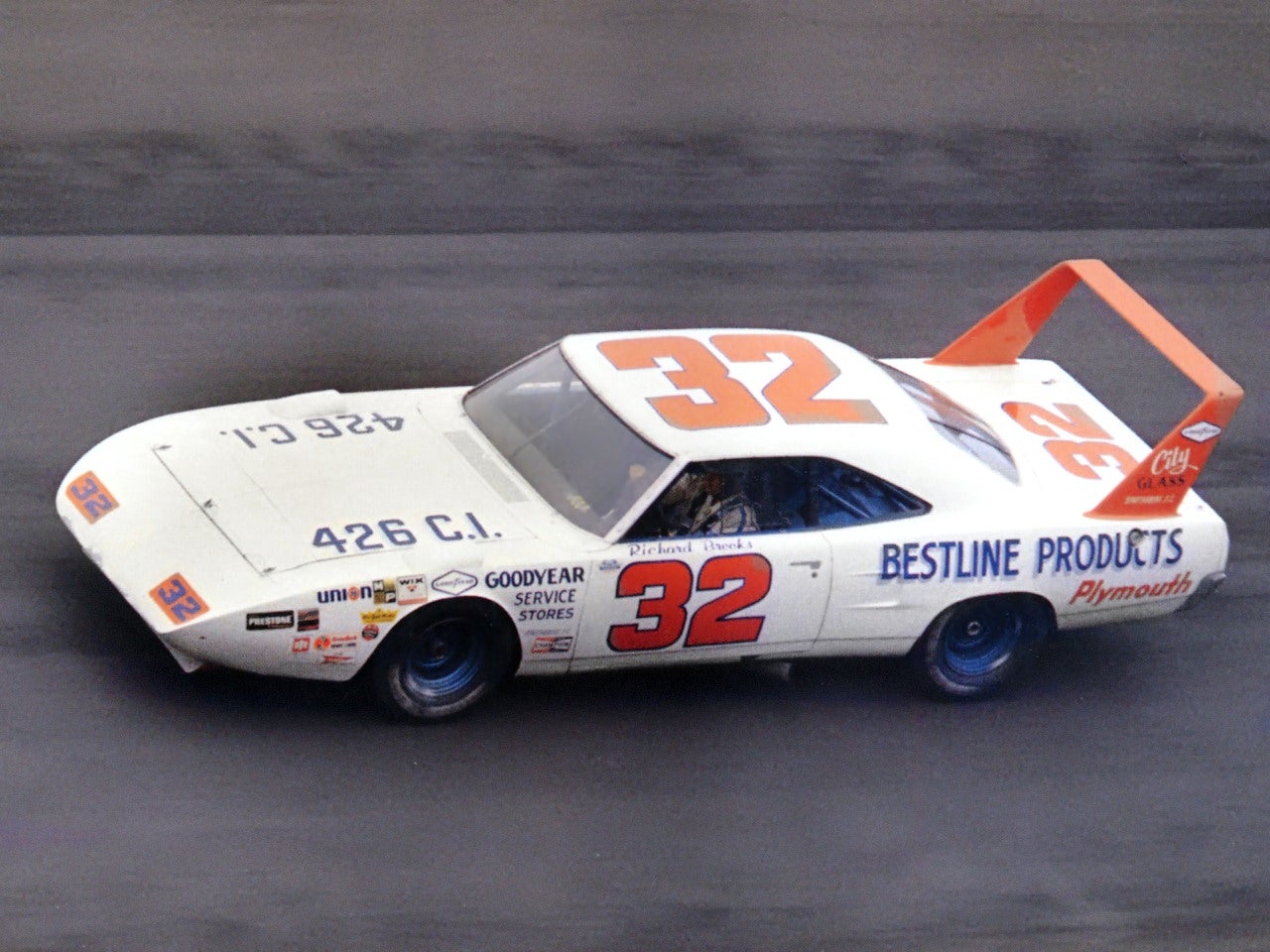
NASCAR regulation originally required manufacturers to sell at least 500 cars to be considered stock and later one for every two dealerships. Teams and manufacturers began to get more creative with how the cars were built to give mechanical advantages in races. NASCAR began it intervene banning fuel injection in 1957. Imagine if NASCAR didn't ban fuel injection and the industry adopted it way back in 1957 instead of the 1990s. What would an extra 40 years of fuel delivery technology do to cars today? The 1969 NASCAR season saw the rise of the iconic Plymouth Superbird, an aerocar designed with aerodynamics to give better traction and cut through the air better. Aerocars were promptly limited to a 305 cubic inch engine which was small in comparison to engines of the time which were around 400 cubic inches. Imagine aerodynamic styled cars catching on sooner than the 1980s. Imagine how much fuel could have been saved had all this technology been developed sooner.
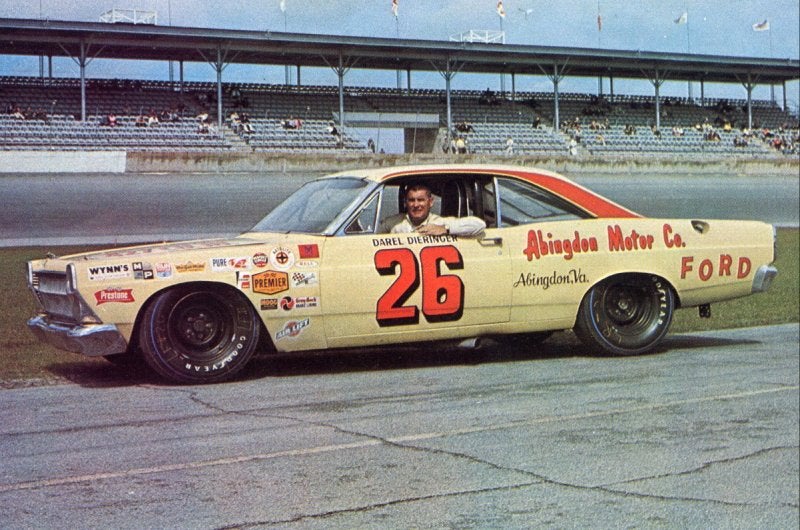
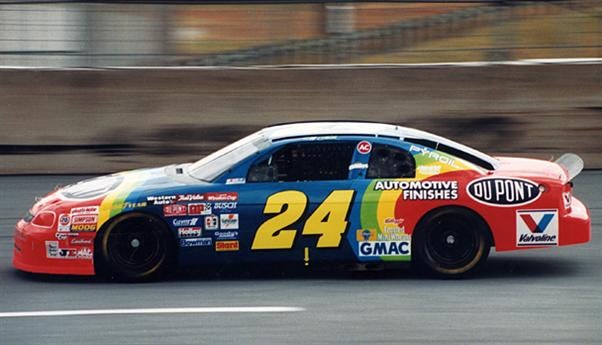
Eventually NASCAR intervened more and more, in efforts to make the race more about driving than the cars. Today the stock cars in NASCAR races only share names with their assembly line counterparts. Regulation has gone as far that all cars, regardless of manufacturer has to have a 4 speed manual transmission, 5.8 liter naturally aspirated pushrod V8 engine and a solid rear axle. This combination hasn't been sold in a production car since the late 1970s. NASCAR only began allowing the use of fuel injection starting in 2012. While NASCAR isn't the only franchise racing "stock cars" these days, it's one of the few who get steady manufacturer support.
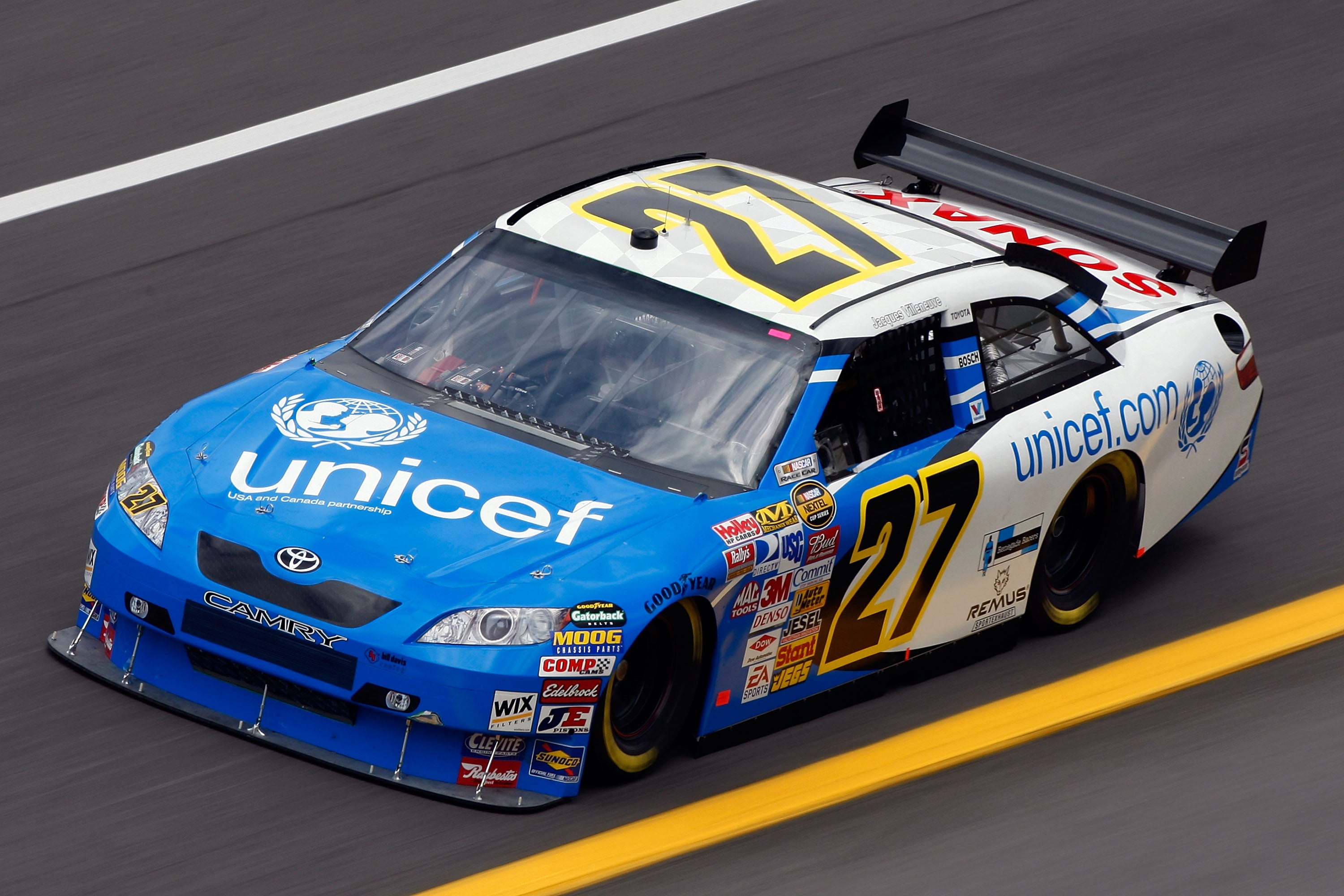
With the world oil supply dwindling we need technological development in our cars now more than ever. A new racing series that uses production vehicles could be mutually beneficial to NASCAR, manufactures, race car drivers, and car buyers. This new series could kindle the development of fuel efficient vehicles, or adapt electric vehicles to be more appealing to the mass market all while providing entertainment to the world and publicity to automobile makers.
Note: This article is the sole property of William G. Enloe High school's The Eagle's Eye. They own the writer's soul so they therefore own this article. This article is still technically a first draft and is subject to change as it is edited through normal Eagle's Eye protocol.
 nFamousCJ - Keeper of Stringbean, Gengars and a Deezul
> Slant6
nFamousCJ - Keeper of Stringbean, Gengars and a Deezul
> Slant6
01/11/2015 at 11:34 |
|
from what I remember, and could be wrong or it has changed, but I believe the hood and roof are the same dimensions as their production counterpart.
Yeah its pretty bland to know every car out there is nearly identical but that does bring back the focus on the driver being the primary variable.
It does bring up a good point though about cars being stock. I personally would love to see a race of off the lot vehicles taking on one of the smaller tracks. Mustang GTs and FRS's going at it, hell even some Abarth 500s vs Hellcats. Then skill, power and mileage would come into play. This would probably be more fun on a road course rather than an oval. And since most cars top out at a governed <150 it would take a while to make it around the oval. But imagine the range of exhaust notes you could potentially hear.
 The Transporter
> Slant6
The Transporter
> Slant6
01/11/2015 at 11:43 |
|
Is this the article you were writing for your school newspaper?
 Arch Duke Maxyenko, Shit Talk Extraordinaire
> nFamousCJ - Keeper of Stringbean, Gengars and a Deezul
Arch Duke Maxyenko, Shit Talk Extraordinaire
> nFamousCJ - Keeper of Stringbean, Gengars and a Deezul
01/11/2015 at 11:46 |
|
http://www.world-challenge.com/
http://www.imsa.com/series/sportsc…
 dogisbadob
> Slant6
dogisbadob
> Slant6
01/11/2015 at 12:03 |
|
National Association of Spec Car Auto Racing :p
But that's hardly the worst problem with NASCAR. Far worse issues include:
The France family, or should I say the China family. Almost as bad as Bernie Fuckerstone.
Too tightly controlling even criticism of the sport. There was a show called Pit Bull like 10 years ago, but NASCAR got them silenced.
Start and park
No right turns
the 50-year fuel injection ban from 1962-2012
NASCAR should do this:
Require the same body as the stock cars
The same engine type, valvetrain, displacement, etc. For example, a 3.5L 4-valve DOHC NA V6. Same amount (if any) of turbochargers and superchargers as stock, and no more than the lesser of (2.5x the hp as stock, or 800 hp). For example, if the stock car has 250 hp, then the race car is limited to 750 hp. If the stock car has 300 hp, the race car is limited to 800 hp.
The race car would be made with pretty much over the counter parts that anybody could get.
At least 2000 copies of the stock car will have to be made per year.
 shop-teacher
> Slant6
shop-teacher
> Slant6
01/11/2015 at 12:03 |
|
I was a fan for a long time, but they've lost me. I will try to watch NASCAR again, when they return to their productiin-based roots (read: never).
 I'm Abe Froman
> Slant6
I'm Abe Froman
> Slant6
01/11/2015 at 12:07 |
|
Stock car racing has confused me since I was a kid because it is a complete oxymoron as the cars have nothing "stock" on them. Another thing about stock car racing that makes it boring in my eyes is the cars are all so similar that it makes the cars completely irrelevant in something that is Motorsport. They've been using big blocks with manual transmission that can't turn right for 30+ years. It's all about the "speed and the passin" kind of like the fans, who find no qualms using their GMC Envoy like a Camaro on the interstate.
European GT series cars are what one could consider true "stock car" race cars.
 Gabor Vajda (@Gabor_V)
> Slant6
Gabor Vajda (@Gabor_V)
> Slant6
01/11/2015 at 12:07 |
|
NASCAR hasn't been stock virtually since they started using full-frame rollcages sometime in the 60s if I'm correct.
 norskracer98-ExploringTheOutback
> dogisbadob
norskracer98-ExploringTheOutback
> dogisbadob
01/11/2015 at 12:08 |
|
Well they run two road courses.... Which are arguably the best races all year.
 norskracer98-ExploringTheOutback
> nFamousCJ - Keeper of Stringbean, Gengars and a Deezul
norskracer98-ExploringTheOutback
> nFamousCJ - Keeper of Stringbean, Gengars and a Deezul
01/11/2015 at 12:09 |
|
CTSCC? Its a great series and is more true stock car racing then NASCAR at this point.
 Gabor Vajda (@Gabor_V)
> nFamousCJ - Keeper of Stringbean, Gengars and a Deezul
Gabor Vajda (@Gabor_V)
> nFamousCJ - Keeper of Stringbean, Gengars and a Deezul
01/11/2015 at 12:10 |
|
No, the hood, the roof and the decklid had to be identical in dimensions until the end of 2002. From 2003 there was only "brand identity" to the templates, nothing related to the actual cars. And then CoT.
 zero9999
> Slant6
zero9999
> Slant6
01/11/2015 at 12:11 |
|
And yet 20 year olds can run around in their little Ford Fiesta thinking their Ken Block and that's cool.
 sdwarf36
> dogisbadob
sdwarf36
> dogisbadob
01/11/2015 at 12:12 |
|
And THEN you'd go to a race?
 Zoom
> Slant6
Zoom
> Slant6
01/11/2015 at 12:14 |
|
Hmmm. 'Production Stock' Car?
Charger vs Impala (or SS maybe but i think Chevy only sold like 35 of them) vs Taurus vs Camry?
Give me that Mopar any day.
 nFamousCJ - Keeper of Stringbean, Gengars and a Deezul
> Arch Duke Maxyenko, Shit Talk Extraordinaire
nFamousCJ - Keeper of Stringbean, Gengars and a Deezul
> Arch Duke Maxyenko, Shit Talk Extraordinaire
01/11/2015 at 12:15 |
|
Yes! Why has noone told me of this before?!
 BBlades
> Slant6
BBlades
> Slant6
01/11/2015 at 12:16 |
|
The level of stock in NASCAR is as much of a problem as the engine not being in front of an Indycar. Peter Delorenzo writes this exact article every year, it is an old chestnut at this point. Most of the people watching NASCAR weren't alive the last time stock cars were used in NASCAR.
 nFamousCJ - Keeper of Stringbean, Gengars and a Deezul
> Gabor Vajda (@Gabor_V)
nFamousCJ - Keeper of Stringbean, Gengars and a Deezul
> Gabor Vajda (@Gabor_V)
01/11/2015 at 12:16 |
|
Well thats a bummer. So really the branding of the cars as a mustang or camaro is just for advertising purposes now?
 I'm Abe Froman
> nFamousCJ - Keeper of Stringbean, Gengars and a Deezul
I'm Abe Froman
> nFamousCJ - Keeper of Stringbean, Gengars and a Deezul
01/11/2015 at 12:16 |
|
They have this but it is mostly recreational or mid-level racing, though no mean cheap...Porsche 911 GT3 RSs, Ferrari Speciales, Corvette Z07s. Mixing it up to create an open track day series. Sounds like a good Elvis flick!
 the7thearlofgrey
> Slant6
the7thearlofgrey
> Slant6
01/11/2015 at 12:18 |
|
and the answer is to SHAKE and BAKE

 Crossed
> nFamousCJ - Keeper of Stringbean, Gengars and a Deezul
Crossed
> nFamousCJ - Keeper of Stringbean, Gengars and a Deezul
01/11/2015 at 12:18 |
|
They raced stock cars on the ROC track last year and they should be here this year. Mentioned in case you want a sneak peak of how they handle and sound on a smaller track.
EDIT: Stands for Race of Champions.
 Gabor Vajda (@Gabor_V)
> nFamousCJ - Keeper of Stringbean, Gengars and a Deezul
Gabor Vajda (@Gabor_V)
> nFamousCJ - Keeper of Stringbean, Gengars and a Deezul
01/11/2015 at 12:18 |
|
For example: Chevy started racing the Lumina back in the day and recently the SS even before there was an actual production car to buy. So, yeah.
 LSXforYourSuperCar
> Slant6
LSXforYourSuperCar
> Slant6
01/11/2015 at 12:18 |
|
Why do they call it football when only the kicker is allowed to use his foot?
Call it Sasquatch Racing League, I ain't care!
 Scott C. Anderson
> Slant6
Scott C. Anderson
> Slant6
01/11/2015 at 12:19 |
|
This is a 30 year old discussion .. NASCARs last good year was 1983 with the aero thunderbird crushing the competition due to its super aerodynamic production form that allowed it to hit 200 mph.. The last good stock cars race ... I worked at Dodge during the Super Touring days, and THOSE where more like stock car .. Using production Stratus bodies with production blocks heavily modified and ran with CART at road race circuits .. ALAS, they received zero marketing and TV time and they fizzled .. They where a North American version of BtCC.. THIER Mistake was using a 2.0L formula instead of v8 like Australia.. They where exciting to watch though.. Lots of good road racing, elbow rubbing, and it was nice to see production car strengths and weaknesses show up on the track ( our Dodge Stratus was widest in set, which made for some challenging aero and lower top speeds, but we destroyed the Accords, BMW 3s, and Camrys in the corner entry and exits..) It was fun.. But ultimately it was crushed by NASCAR popularity .. Which I never understood cause nascar was like old school bench racing .. But hey.. Give the huddled masses what they want .. Dodge then started NASCAR design and development in 1998 with the Dodge Intrepid, and I actually got excited because the cab forward body style was gonna give us a HUGE front downforce advantage at the track as well as a slippery profile for more top speed .. Until France quashed it under his boot and forced us to use the Chevy templates .. Boooo.. And it was then, at that very moment, I swore off NASCAR as a joke cracker barrel sticker series.. it isn't relevant to me, and never will be until I see production cars again.. Hell I'd rather even see a god damned minivan race series!!!
 TjKeller0014
> Slant6
TjKeller0014
> Slant6
01/11/2015 at 12:19 |
|
A new racing series that uses production vehicles could be mutually beneficial to NASCAR, manufactures, race car drivers, and car buyers. This new series could kindle the development of fuel efficient vehicles, or adapt electric vehicles to be more appealing to the mass market all while providing entertainment to the world and publicity to automobile makers.
You mean the American Le Mans Series???? Oh, wait..... thanks a lot Brian France and Co.
Also, the Pirelli World Challenge would like a word with you.
 willmederski
> Slant6
willmederski
> Slant6
01/11/2015 at 12:20 |
|
and this is why i pay no attention to NASCAR.
truth is, there aren't too many series these days that have a homologation requirement.
personally, i don't really care much for F1 either. amazing pieces of tech, but SO far distant from street applications. and the yearly changes in engine reqs makes me think the engineers are just struggling to keep up with the changes to care much about passing the tech down to their consumer production.
LM interests me because they are at least building with endurance in mind. if you can build a tire that lasts longer = fewer pit stops. but even then, they get to swap out an entire drivetrain if they want...
in the end, every race car is rebuilt after a race. so if so much of the tech either requires replacement or rebuilding after a race, it's pretty unrelated to consumer vehicle use.
(this is why supercars are so $$$ to maintain. they are race cars)
 TheStigsGermanCousin
> Slant6
TheStigsGermanCousin
> Slant6
01/11/2015 at 12:21 |
|
"NASCAR regulation originally required manufacturers to sell at least 500 cars to be considered stock and later one for every two dealerships. Teams and manufacturers began to get more creative with how the cars were built to give mechanical advantages in races. NASCAR began it intervene banning fuel injection in 1957. Imagine if NASCAR didn't ban fuel injection and the industry adopted it way back in 1957 instead of the 1990s. What would an extra 40 years of fuel delivery technology do to cars today? The 1969 NASCAR season saw the rise of the iconic Plymouth Superbird, an aerocar designed with aerodynamics to give better traction and cut through the air better. Aerocars were promptly limited to a 305 cubic inch engine which was small in comparison to engines of the time which were around 400 cubic inches. Imagine aerodynamic styled cars catching on sooner than the 1980s. Imagine how much fuel could have been saved had all this technology been developed sooner."
So NASCAR hindered the advancement of cars today. Wow, i had no Idea NASCAR had such a massive influence over manufacturers.
 I'm Abe Froman
> Slant6
I'm Abe Froman
> Slant6
01/11/2015 at 12:21 |
|
"Regulation has gone as far that all cars, regardless of manufacturer has to have a 4 speed manual transmission.."
Imagine if they had allowed sequential transmissions with straight-cut gears. This explains why we are behind in the automatic transmission technology, using torque converters for 60 years while Europe has several options.
 Doug Radcliffe
> The Transporter
Doug Radcliffe
> The Transporter
01/11/2015 at 12:23 |
|
Harsh. What was the problem? I liked this article.
 Have Jeep, will travel.
> Slant6
Have Jeep, will travel.
> Slant6
01/11/2015 at 12:25 |
|
NASCAR sucks. Its the Pro Wrestling of Motorsports. For the reasons you mention. And its boring as hell. Thats why I like legitimate motorsports where actual production chassis cars run.
 Arch Duke Maxyenko, Shit Talk Extraordinaire
> nFamousCJ - Keeper of Stringbean, Gengars and a Deezul
Arch Duke Maxyenko, Shit Talk Extraordinaire
> nFamousCJ - Keeper of Stringbean, Gengars and a Deezul
01/11/2015 at 12:26 |
|
idk
 whotakethmycoke
> nFamousCJ - Keeper of Stringbean, Gengars and a Deezul
whotakethmycoke
> nFamousCJ - Keeper of Stringbean, Gengars and a Deezul
01/11/2015 at 12:26 |
|
I never did understand how watching cars driving in a circle was good entertainment. I wouldn't go as far to say that all F1 courses are more fun, but provided they allow for more passes, they're way more interesting than NASCAR.
 The Stig's Rustbelt Cousin
> Slant6
The Stig's Rustbelt Cousin
> Slant6
01/11/2015 at 12:28 |
|
This pseudo-article/essay makes several false presumptions, chief among which is the idea that NASCAR could have anything to do with advancing technology for street cars. EFI was entering the mainstream (even among the Big 3) in the 1980s, and by the 1990s, the last carbureted cars for sale in the US were not made by a NASCAR participant (I think Isuzu was the last one). NASCAR banned fuel injection to keep the costs reasonable for the racing teams, who built their own engines. Your argument is faulty because you believe that Ford/GM/Chrysler built racing engines, which is false. If they did, there would be no cost consideration whatsoever, because they could simply sell/lease an engine that cost them $20,000 to build for $500 per season, writing the losses off as promotional expenses. Incidentally, that's pretty much how motorsports has always worked; no car company fields a racing team with the intent of generating a profit from it.
You also claim that NASCAR's restrictions on "aero cars" set automotive design back, which is also completely false. Aerodynamic designs for street cars and racing cars are two completely different concepts, mainly because one is designed to work at racing speeds, while the other clearly isn't. (In fact, the aerodynamic properties of racing cars would give them worse fuel economy than street cars, and street cars become unstable at higher speeds.) Aerodynamic efficiency wasn't a design consideration in the 1960s and 70s because the idea of applying the idea to cars was brand new. F1 teams were just starting to figure it out, and most car manufacturers (even the big ones) did not have money to spend on development. it wasn't until governments started mandating fuel economy that car makers started caring about the drag coefficients of economy cars.
I have never been a fan of NASCAR, as I consider it less of a motorsport than it is a marketing/entertainment series, designed to appeal to the lowest common denominator. NASCAR is to racing what Kid Rock and Nickelback are to music. Your assumptions about NASCAR having the ability to influence street car technology are simply inaccurate, as you've attempted to ascribe the slower technological progress of the American auto industry to NASCAR, rather than their own ignorance, indifference, and apathy.
 The Transporter
> Doug Radcliffe
The Transporter
> Doug Radcliffe
01/11/2015 at 12:29 |
|
It's not a harsh criticism. He was asking questions here yesterday about NASCAR because he was writing an article about it for his school's newspaper.
 Nate with shorter name
> sdwarf36
Nate with shorter name
> sdwarf36
01/11/2015 at 12:29 |
|
Well, it might get me to buy a NASCAR inspired Camry. If by Camry we mean a turbocharged V8 with rwd a six speed manual and stock 700 HP. Like one of the Hellcat variants only with a stealthy (boring) exterior.
 Axel-Ripper
> Slant6
Axel-Ripper
> Slant6
01/11/2015 at 12:30 |
|
You make it more stock, it becomes more boring to watch, and substantially less safe. Good luck with that.
 Driver
> Slant6
Driver
> Slant6
01/11/2015 at 12:30 |
|
And it would kill a lot of drivers. Race cars are built to crash at speed, stock cars, not so much.
 QQXQXL123
> Slant6
QQXQXL123
> Slant6
01/11/2015 at 12:30 |
|
It's a shame really - right now you've got Dodge, Chevy, Cadillac, and Chrysler all with 5.5 - 6.0 V8 RWD sedans that could have roll cages bolted into them tomorrow. That would be a decent championship. I guess Ford and Toyota might complain, but then they might bring something of their own instead.
 Nasal Radiator
> Slant6
Nasal Radiator
> Slant6
01/11/2015 at 12:30 |
|
Agreed. That is all.
 ly2v8-Brian
> Slant6
ly2v8-Brian
> Slant6
01/11/2015 at 12:31 |
|
Except for the wheel base the body of the current cup car are within fractions of an inch of the street counter part. This style of racing is on the razors edge, so to me for the sake of safety as long as the body matches the street car that's good enough.
But it doesn't matter everyone on here is quick to hate NASCAR.
 The Stig's Rustbelt Cousin
> TheStigsGermanCousin
The Stig's Rustbelt Cousin
> TheStigsGermanCousin
01/11/2015 at 12:31 |
|
Indeed they do. The rest of the world's automobile makers were busy developing fuel injection technology on the off-chance that NASCAR would someday allow it.
 speeddemon807
> Slant6
speeddemon807
> Slant6
01/11/2015 at 12:33 |
|
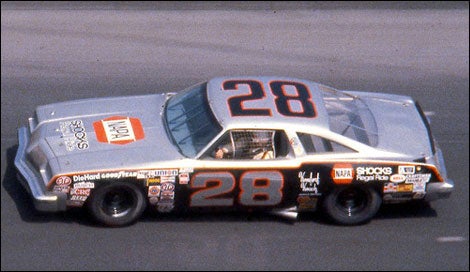
2003 where all cars were in a common template form that was a precedent for the COT and the current gen 6 cars now.
1970s stock car
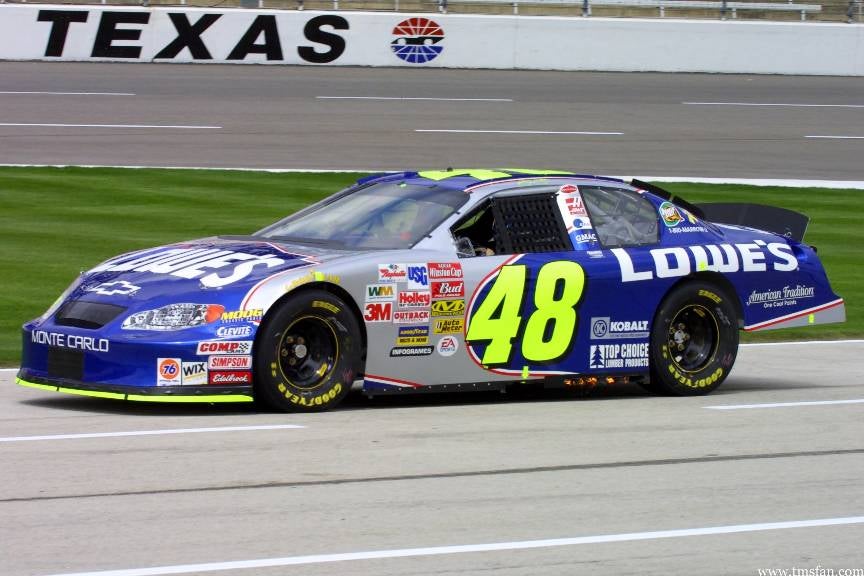
2003 common template of the Chevy Monte Carlo to conform with the Taurus, Intrepid, Camry(2007) and Grand Prix(2003 was the last year of Pontiac)
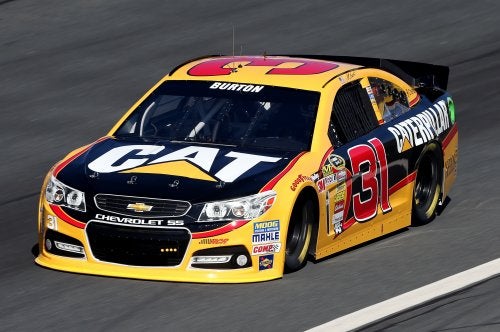
Current Gen 6 Nascar but almost a stock car but its not. Most of the Gen 6 cars are sedans of the SS, Camry and Fusion.
 ScreenShot
> Slant6
ScreenShot
> Slant6
01/11/2015 at 12:33 |
|
Just like Big Time Wrestling, where actors are called 'athletes'. NASCAR's purpose built turn-lefters are called 'stock' and are just actors in disguise.
 shootsandleaves
> LSXforYourSuperCar
shootsandleaves
> LSXforYourSuperCar
01/11/2015 at 12:33 |
|
The ball is 12 inches.
 AholeMajorAhole
> Slant6
AholeMajorAhole
> Slant6
01/11/2015 at 12:34 |
|
It really depends on what you want the term "stock" to mean. A production/factory stock vehicle with race preparation like you have with sports car racing or special purpose built cars that are part of a stock like what NASCAR currently is. The cars of NASCAR are nearly identical to each other (ie. from a "stock" of cars) with only tweaks being allowed to the base vehicle.
Homogeneity is the key, whether or not it resembles the original consumer product is irrelevant.
Formula E could also be viewed as "stock" car racing.
 Doug Radcliffe
> The Transporter
Doug Radcliffe
> The Transporter
01/11/2015 at 12:39 |
|
Ohhh, yes, your comment reads very differently now that I know that.
 Oran J Sands III
> Slant6
Oran J Sands III
> Slant6
01/11/2015 at 12:42 |
|
Your arguments for technological advancement would hold up if Nascar was the only racing series in town. But it's not. Indy car racing, F1, etc. have been pushing the envelope since the beginning and although production based car racing has been stagnant other series have been swapping and developing technology as rapidly as possible. Aero design, fuel injection, turbos, suspension components and design have been greatly enhanced over the years in both racing and production. Admittedly acceptance of these things might have been greater in the Deep South if Nascar had allowed them but everyone else gladly adopted the advancements as soon as they were offered.
 N.Guise
> Slant6
N.Guise
> Slant6
01/11/2015 at 12:44 |
|
I can't wait for 30 minute pit stops while they recharge a leaf.
 Outie5000
> Axel-Ripper
Outie5000
> Axel-Ripper
01/11/2015 at 12:45 |
|
Except Grand-Am is all stock cars with safety equipment and certain air restrictions... And it's way more enjoyable to watch than nascar.
 cluelessk
> nFamousCJ - Keeper of Stringbean, Gengars and a Deezul
cluelessk
> nFamousCJ - Keeper of Stringbean, Gengars and a Deezul
01/11/2015 at 12:45 |
|
Same thing I said once someone turned me to it.
 onerunjunior
> ly2v8-Brian
onerunjunior
> ly2v8-Brian
01/11/2015 at 12:48 |
|
Except for the wheel base the body of the current cup car are within fractions of an inch of the street counter part.
.....what? Are you serious?
 onerunjunior
> Axel-Ripper
onerunjunior
> Axel-Ripper
01/11/2015 at 12:49 |
|
Substantially less safe? Can you provide any validation for that statement?
 mwoodski
> Slant6
mwoodski
> Slant6
01/11/2015 at 12:49 |
|
I want you to look up what people in England call a stock car and then get back to me on this article.
 99TandC
> onerunjunior
99TandC
> onerunjunior
01/11/2015 at 12:53 |
|
Having a steel tube frame roll cage is infinitely safer than anything you can find on a dealer's showroom floor. It's not even debatable.
 onerunjunior
> The Stig's Rustbelt Cousin
onerunjunior
> The Stig's Rustbelt Cousin
01/11/2015 at 12:53 |
|
no car company fields a racing team with the intent of generating a profit from it.
This is also completely false/disingenuous like you call the article out on. They DO generate a profit from exposure and sales, and not from winnings. Corvette Racing had to fight hard with the government after GM went tits up and they had to show that they were a vital part of GM making vehicle sales. That they do is the reason they existed while GM was under serious scrutiny. There's no goddamn way any manufacturer would enter a series and spend that kind of money if they didn't get a return equal to their investment. You stating something this ignorant is surprising considering your tone throughout your comment. It's amazing that you even believe that nonsense.
 onerunjunior
> 99TandC
onerunjunior
> 99TandC
01/11/2015 at 12:55 |
|
Are you trolling? They wouldn't race without one. No series allows that anywhere in the world.
 Kylemaro
> Slant6
Kylemaro
> Slant6
01/11/2015 at 12:56 |
|
"Imagine if NASCAR didn't ban fuel injection and the industry adopted it way back in 1957 instead of the 1990s."
what do you mean by this? because nascar racecars weren't fuel injected until last season.
 quirt
> nFamousCJ - Keeper of Stringbean, Gengars and a Deezul
quirt
> nFamousCJ - Keeper of Stringbean, Gengars and a Deezul
01/11/2015 at 12:57 |
|
Really? You didn't know about PWC and IMSA?
 cronan_of_Sweden
> Slant6
cronan_of_Sweden
> Slant6
01/11/2015 at 12:57 |
|
WTCC, BTCC, DTM?
 axtell
> Axel-Ripper
axtell
> Axel-Ripper
01/11/2015 at 12:57 |
|
I dont think he's proposing the removal of safety equipment...
 Kylemaro
> dogisbadob
Kylemaro
> dogisbadob
01/11/2015 at 12:58 |
|
you do know you can literally go to any of the teams shops in and around charlotte and buy nascar racecar parts right?
 camaroboy68ss
> The Stig's Rustbelt Cousin
camaroboy68ss
> The Stig's Rustbelt Cousin
01/11/2015 at 13:03 |
|
While I agree with some of your points of argument that NASCAR hasn't hindered Technological development in production cars, I think some points also need a little clarifying. GM/Ford/Chrysler DID build race only motors at one point or another. Some examples of that would be the mystery motor Chevy built in 1963(prototype big block), Mopars Hemis were special race only versions that were never offered to the public, and Ford skirted the production rule on the BOSS 429's by sticking them into Mustangs instead of Torinos and Cyclones like that was ran.
With aerodynamics NASCAR really just put a hamper on the manufacturers on creating wild aero bits like seen on the Dayont/Superbird. The cars following the Aerowars of 69/70 didn't hurt as much than when NASCAR went to smaller chassis in the early 80's. But the banning of those little bits did slow the cars down(tire tech was a huge concern), but you cant disregard the fact that was some impact at the mass production level. You began to see the rear windows become flush mounted and no huge recessed grilles after the aerowars.
 HanShotFirstAskGreedo
> Slant6
HanShotFirstAskGreedo
> Slant6
01/11/2015 at 13:03 |
|
I find NASCAR to be intensely boring. Then I went to a race (for free), and when the green flag dropped, I "got it" and was super excited. For three laps. Then intensely bored. Position changes and passing are what make races exciting. Especially with left AND right turns. Speed alone does not make good racing
 GasMan
> onerunjunior
GasMan
> onerunjunior
01/11/2015 at 13:04 |
|
An INTEGRATED cage as part of the structure is way more safe than one welded to a manufactured unibody. Obviously you don't understand anything about race cars.
 Kylemaro
> ly2v8-Brian
Kylemaro
> ly2v8-Brian
01/11/2015 at 13:04 |
|
i know, its kinda ridiculous. its (management aside) a great racing series. with alot of great people
 Kylemaro
> Zoom
Kylemaro
> Zoom
01/11/2015 at 13:05 |
|
dodge pulled out, hasn't been a charger on track since brad k won his championship
 Kylemaro
> The Stig's Rustbelt Cousin
Kylemaro
> The Stig's Rustbelt Cousin
01/11/2015 at 13:06 |
|
thank you
 Bosshog2
> Axel-Ripper
Bosshog2
> Axel-Ripper
01/11/2015 at 13:07 |
|
Then call it stock hood and roof racing. Its so bogus to call it stock car. WRC is much closer to stock car racing than stock car racing
 dogisbadob
> Kylemaro
dogisbadob
> Kylemaro
01/11/2015 at 13:12 |
|
Yeah, but are they installable on the cars they're "based on?"
That's what I meant by available over the counter, but I should've specified that they should be interchangeable with the stock car.
 DrScientist
> dogisbadob
DrScientist
> dogisbadob
01/11/2015 at 13:13 |
|
i like you suggestions, seeing cars with different types of engines, different displacements and boost strategies would make interesting racing.
(i think your calculations are off though, would be 625hp for the 250stock, and 750 for the 300stock.)
 west-coaster
> Slant6
west-coaster
> Slant6
01/11/2015 at 13:15 |
|
A couple of years ago at the L.A. Auto Show, Toyota had a chassis of their Sprint Cup car on display. One of those highly-detailed assemblies with everything painted bright colors or chrome plated, holes cut into the block and transmission case to see the internals, etc.
The thing is, it was laughable, as there were pretty much no parts in common with any of their production vehicles on display. The pushrod V8 engine? No. The 4-speed manual transmission? No. The solid rear axle and differential? No, though maybe loosely related to the one in the Tundra. And on it went; a display of parts from the 1960s that Toyota never built.
 Zoom
> Kylemaro
Zoom
> Kylemaro
01/11/2015 at 13:20 |
|
Er...
I think I was referring to 'Taking a production car, and running it in stock fashion on an oval track'.
Genius.
 ranwhenparked
> Slant6
ranwhenparked
> Slant6
01/11/2015 at 13:22 |
|
The fundamental problem is the question of whether racing should be purely about the drivers or a combination of driving ability and pushing the limits of engineering and technology. NASCAR has obviously chosen to exclusively rely on the former, and it seems like more and more other race series are going in that direction too. For car enthusiasts, we would rather see the latter concept win out, but I suspect that the more casual fan prefers the focus exclusively on drivers.
 Delta88
> Kylemaro
Delta88
> Kylemaro
01/11/2015 at 13:22 |
|
I think he means consumer street cars got EFI in the 90s. But if NASCAR adopted it in the 50s, consumer cars would've had it before the 90s and we'd be farther ahead now.
 DrScientist
> Kylemaro
DrScientist
> Kylemaro
01/11/2015 at 13:24 |
|
i believe he's suggesting that the auto industry may have adopted fuel injection sooner, if nascar didnt ban it until recently.
im not sure if this argument holds water, but its an interesting question.
 mrbwa1
> nFamousCJ - Keeper of Stringbean, Gengars and a Deezul
mrbwa1
> nFamousCJ - Keeper of Stringbean, Gengars and a Deezul
01/11/2015 at 13:30 |
|
You must not be forking over a small fortune for Fox Sports 2 and NBCSN. Also, MAVTV Showa a lot of alternate racing series. Unfortunately, my budget no longer allows to drop $100+ per. I think just so I can watch these series...
I bet they are online somewhere thought so I'll have to look.
 Sam
> Slant6
Sam
> Slant6
01/11/2015 at 13:31 |
|
We need to remember that NASCAR "Stock Cars", are a brand name not actually stock cars.
 sounbwoy
> Slant6
sounbwoy
> Slant6
01/11/2015 at 13:32 |
|
No disrespect, but the issue of NASCAR racers not being stock is way beyond being beaten into the ground and I get it. No one complains about the Australian V8 Series, where the cars look like the stock vehicles, but also have very little in common with them (V8 Nissan Altimas as an example). Do Australians/Americans buy more Holdens, Falcons, Altimas, Chevys, Fords because of the series? Or do fans just enjoy the RACING?
 dogisbadob
> DrScientist
dogisbadob
> DrScientist
01/11/2015 at 13:32 |
|
Yeah whoops, sorry about that!
I was originally thinking 3x the stock power, but then I changed my mind and said 2.5x, but I didn't update my examples.
yeah, epic fail on my part :(
 ly2v8-Brian
> onerunjunior
ly2v8-Brian
> onerunjunior
01/11/2015 at 13:32 |
|
here watch this. This is the SS reveal at Daytona they talk about how close they are at 9:40.
 Sam
> nFamousCJ - Keeper of Stringbean, Gengars and a Deezul
Sam
> nFamousCJ - Keeper of Stringbean, Gengars and a Deezul
01/11/2015 at 13:33 |
|
I looked at the interior of a Sportscar Challenge Cayman and it was LITERALLY A STRIPPED CAYMAN. I was hooked instantly. Then they decided they didn't want to race at Indianapolis anymore. No more modern racing for me I guess.
 ly2v8-Brian
> Kylemaro
ly2v8-Brian
> Kylemaro
01/11/2015 at 13:34 |
|
Absolutely. It's so much more complicated than 'just turning left'
 EL_ULY
> ranwhenparked
EL_ULY
> ranwhenparked
01/11/2015 at 13:39 |
|
I'm all fot the tech push, but damn F1 was impossible to watch last couple of years.. I love me some good racing and nascar provided better action. It's not like they are not highly engineered racecars, ever. Enthusiasts are so easily impressed as well. They adore V8SC which are also tube chassis cars along with DTM and others. I bet if they add headlights, brake lights, wipers, an "interior", doors, and more street looking wheels and tires, it should change a lot of minds.
 EL_ULY
> ScreenShot
EL_ULY
> ScreenShot
01/11/2015 at 13:41 |
|
They have road courses and the cars are highly engineered for their motorsport. If you want driver drama and diva rants, F1 is the place to be lol.
 E Shotropa
> Slant6
E Shotropa
> Slant6
01/11/2015 at 13:43 |
|
I thought it was "win on Sunday, sell on Monday". If not, when did it changed?
 Mister Win Blames People, Not Guns
> Axel-Ripper
Mister Win Blames People, Not Guns
> Axel-Ripper
01/11/2015 at 13:45 |
|
If it's substantially less safe, it can't be more boring to watch. Your argument is invalid.
 crowmolly
> Slant6
crowmolly
> Slant6
01/11/2015 at 13:45 |
|
While I love to gripe about the lack of stock in NASCAR, there's no way the cars could be as safe as they are using production chassis. What's worse that watching people race around in a circle not passing at 160mph? Doing it at 90mph.
I still contend that they should all be given a 250 shot of N2O for every large oval race. Good for one burst, and it's up to the driver to hit it or not. If the engine goes boom, too bad.
 Wampa
> Slant6
Wampa
> Slant6
01/11/2015 at 13:47 |
|
They could have at least painted the B pillar black.
 Wild Weasel
> Slant6
Wild Weasel
> Slant6
01/11/2015 at 13:55 |
|
In this day and age, it's just the words used to describe this sort of racing. Get over it. If you want your idea of "stock" car racing, go watch an autocross.
This topic comes up every now and then and every time I hear it I just think it's written by an idiot ranting about something they obviously don't understand.
If you simply forget the word "stock" and maybe make up a new one that better describes the product, will everything be rainbows and happiness in your world? Are you suggesting they should take a brand with all the history they've got and change it to NACAR?
Fans don't care. The product is still mostly great fun to watch. Get over it.
 etotherescue
> quirt
etotherescue
> quirt
01/11/2015 at 13:56 |
|
I think he was just being sarcastic............I HOPE!
 RichH1
> Slant6
RichH1
> Slant6
01/11/2015 at 13:59 |
|
Exactly why I don't watch NASCAR. Now if NASCAR required each car to have a production homologation model - we could see some crazy cars back in dealerships. The money involved, the viewership might make manufacturers actually make cool race related cars again. It may even bring in other manufacturers not normally involved. But they would need to keep the suspension geometry, engine displacement and arrangement, and exact body style.. excetp for maybe a few splitters and louvres.
 Forgetful
> Slant6
Forgetful
> Slant6
01/11/2015 at 14:00 |
|
Racing should not be about just the cars or just the drivers. Just like Football is not about just the players and the teams. Like any sport, racing should be about the quality of the product on the track. Close, competitive racing is the most important thing, and that is why actual production street cars aren't ideal for top level oval racing.
Basically the more different the cars are, the less competitive the racing will be. This can be managed with Balance of Performance, but in oval racing the margins are so thin that the best racing comes when everyone has pretty much the exact same car.
 Brock Landers
> Slant6
Brock Landers
> Slant6
01/11/2015 at 14:01 |
|
New Name should be National Association of Spec Car Auto Racing. NASCAR
 Abnwy
> Slant6
Abnwy
> Slant6
01/11/2015 at 14:04 |
|
bare minimum they should at least have to offer the platform to consumers. Last I checked the fusion and Camry aren't offered in a v8 red option
 8695Beaters
> Axel-Ripper
8695Beaters
> Axel-Ripper
01/11/2015 at 14:08 |
|
Diasgree. Touring car racing is very safe and amazing to watch. But since it isn't on ovals the NASCAR crowd doesn't car. Same problem with the Tudor racing series...no ovals. The NASCAR fans are really sprint car fans that don't want to get dirty and want to overpay for beer and snacks. Kind of a shame really.
This is why Time Attack needs to become more popular. Look up the Nemo EVO, Sierra sierra EVO, the ARK GT-R, the Under Suzuki Silvia, the Garage Revolution RX-7...now tell me how much more wicked those cars would be with some OEM R&D invested in them.
 onerunjunior
> GasMan
onerunjunior
> GasMan
01/11/2015 at 14:11 |
|
I was asking him a question and he answered with the stupidity that they wouldn't have cages, which is complete nonsense. I know plenty about racecars, actually built one once upon a time. But keep on trying to act like you're some badass on the internet.
 onerunjunior
> ly2v8-Brian
onerunjunior
> ly2v8-Brian
01/11/2015 at 14:13 |
|
All I see is a similar silhouette and it's not within fractions of an inch, it's multiple inches off from being close to the same shape. They aren't as close as they would lead you to believe, the greenhouse and everything else is tightly regulated to even the playing field to the point where all of the cars have very similar shapes. You also must take into account how they don't compare their car to the rest of the field, and why they only show the side on view. The cars are similar, but not within fractions of an inch and they are more similar to each other than any manufacturer would admit, especially Chevrolet.
 Henry Beal
> sounbwoy
Henry Beal
> sounbwoy
01/11/2015 at 14:18 |
|
Motorsport is slowly going to sh*t, because series rely on manufacturer involvement to be successful. The most attractive regs for manufacturers are those that mandate the cars are close to stock or those that require them to push the envelope, because these are the easiest to market (thereby creating more manufacturer interest, creating a cycle). For some reason, the FIA, NASCAR, etc. don't understand that. The FIA kinda gets it (F1, WEC, GT3), but then comes up with sh*t like the WR Car, which isn't related to stock at all, nor is it pushing the envelope (I blame the WR Car more for the WRC's lack of popularity in the last decade in comparison to the 25 years before that, when you had high-tech Group B and stock Group A). I would love NASCAR if the rules stated that 5000 must be sold, it must have a V8, cost less than $50,000, it must have a rollcage (and other safety equipment if necessary), it must be manual and all you can modify is the suspension, the tyres and rims (the brakes?) and strip out the interior. You'd end up with Camaro ZL1/Z28 v Mustang GT350/GT500 v Challenger Hellcat =dream
 ScreenShot
> EL_ULY
ScreenShot
> EL_ULY
01/11/2015 at 14:19 |
|
They only recently went to fuel-injection. They run solid rear axles and the shifter is still on the floor. The bodies are the same except for theme. They are relics to a bygone age. Dinosaurs.
Way to be a NASCAR cookie-cutter tech apologist. Good luck w/that.
 matt davidson
> nFamousCJ - Keeper of Stringbean, Gengars and a Deezul
matt davidson
> nFamousCJ - Keeper of Stringbean, Gengars and a Deezul
01/11/2015 at 14:20 |
|
"from what I remember, and could be wrong or it has changed, but I believe the hood and roof are the same dimensions as their production counterpart." no
 DKirk
> Slant6
DKirk
> Slant6
01/11/2015 at 14:20 |
|
NASCAR needs to look seriously at Australia's V8 Super Car and emulate that. Give us real cars and occasionally throw us a right turn. Give us the feel of F1 on public streets. NASCAR could be so much more exciting to watch! When I see a "Ford" I really want to see a Ford vehicle, not a cookie-cutter assembled box of parts that they all share. The painted on grills look silly, come one.
I would also welcome V8 Super Car to being offering memberships via Roku streaming video player to allow us to watch their superior races via the awesome Roku interface.
 bobrayner
> Slant6
bobrayner
> Slant6
01/11/2015 at 14:22 |
|
This is an eternal problem. We can't get out of this cycle:
* The wellspring of professional motor racing is that manufacturers want to show off their cars. Race victories improve the brand which means normal people buy more of that manufacturer's cars.
* To race against other manufacturers, they need some kind of racing series or formula which sets some ground rules
* Manufacturers want to win races, so they try clever tricks to optimise cars, so the racing series or formula imposes constraints to stop these clever tricks.
* Now the main constraints on performance are not the carmaker's ability to optimise solutions in the whole of engineering-space, so to speak, but to optimise solutions within a much smaller space set by the racing series or formula.
Nascar just takes this to an extreme; every manufacturer is using almost-identical cars which just have a few decals that vaguely resemble the styling cues on retail cars.
"Silhouette racers" are a symptom of slightly less restrictive series, where the toughest constraint is that cars must have a similar silhouette to retail cars; but underneath it's something very different.
Remember the trick with the Porsche 935? They were, in principle, based on Porsches that normal people could buy off the forecourt; but Porsche found that forecourt cars didn't have good enough aerodynamics at the rear once they were adapted to the racetrack, so the 935/77 added a second rear window which improved the airflow. That's the exact opposite of what you'd do if you were building a racecar (or a retail sportscar) from scratch, but if you're working within the rules of a racing formula that expects racecars to be based on non-racecars, it suddenly looks like a very clever engineering kludge.